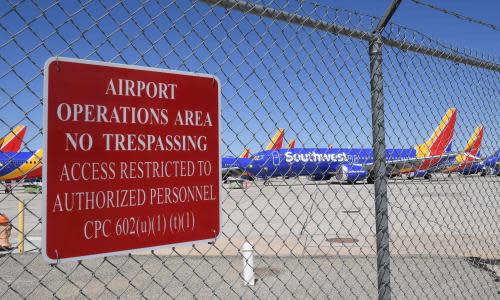The Guardian
Corporations are endangering Americans. Trump doesn’t care

Why didn’t Boeing do it right? Why isn’t Facebook protecting user passwords? Why is Phillip Morris allowed to promote vaping? Why hasn’t Wells Fargo reformed itself? Why hasn’t Monsanto (now owned by Bayer) recalled its Roundup weedkiller?
Answer: corporate greed coupled with inept and corrupt regulators.
These are just a few of the examples in the news these days of corporate harms inflicted on innocent people.
To be sure, some began before the Trump administration. But Trump and his appointees have unambiguously signaled to corporations they can now do as they please.
Boeing wanted to get its 737 Max 8 out quickly because airlines want to pack in more passengers at lower fuel costs (hence the “max”). But neither Boeing nor the airlines shelled out money to adequately train pilots on the new software made necessary by the new design.
Related: Monsanto says its pesticides are safe. Now, a court wants to see the proof | Carey Gillam
Nonetheless, Trump’s FAA certified the plane in March 2017. And after two subsequent deadly crashes, the US was slower to ground them than other countries.
Last week Facebook admitted to storing hundreds of millions of Facebook users’ passwords in plain text that could be searched by more than 20,000 Facebook employees. The admission came just a year after the Cambridge Analytica scandal revealed that Facebook shared the personal data of as many as 87 million users with a political data firm.
In reality, Facebook’s business model is based on giving personal data to advertisers so they can tailor their pitches precisely to potential customers. So despite repeated reassurances by Mark Zuckerberg, the firm will continue to do what it wants with personal information.
The Federal Trade Commission (FTC) has the power to force Facebook to better guard users’ privacy. But so far Trump’s FTC has done nothing – not even to enforce a 2011 agreement in which Facebook promised to do just that.
Altria (Phillip Morris) was losing ground on its sales of cigarettes, but the firm has recently found a future in vaping. Because inhaling nicotine in any form poses a health hazard, the FDA commissioner Scott Gottlieb wanted to curb advertising of vaping products to teenagers.
Gottlieb thought he had Altria’s agreement, but then the firm bought the vaping company Juul. Its stock has already gained 14% this year. What happened to Gottlieb? He’s out at the FDA, after barely a year on the job.
Wells Fargo has publicly apologized for having deceived customers with fake bank accounts, unwarranted fees and unwanted products. Its top executives say they have eliminated the aggressive sales targets that were responsible for the fraud.
But Wells Fargo employees told the New York Times recently that they’re still under heavy pressure to squeeze extra money out of customers. Some have witnessed colleagues bending or breaking internal rules to meet ambitious performance goals.
What has Trump’s Consumer Financial Protection Agency done about this? Nothing. It’s been defanged.
This week, a federal jury awarded $80 million in damages to a California man who blamed Monsanto’s (now Bayer’s) Roundup weedkiller for his cancer, after finding that Roundup was defectively designed, that Monsanto failed to warn of the herbicide’s cancer risk, and that the company acted negligently. It was the second jury in eight months to reach the same conclusion about Roundup.
Roundup contains glyphosate, a suspected carcinogen. Cases from more than 1,000 farmers and other agricultural workers stricken with non-Hodgkin lymphoma are already pending in federal and state courts.
What has Trump’s Environmental Protection Agency done about glyphosate? In December 2017 its office of pesticide programs concluded that glyphosate wasn’t likely to cause cancer – although eight of the 15 experts on whom the agency relied expressed significant concerns about that conclusion, and three more expressed concerns about the data.
Related: The US is on the edge of the economic precipice – and Trump may push it over | Robert Reich
These are just tips of a vast iceberg of regulatory neglect, frozen into place by Trump’s appointees, of which at least 187 were lobbyists before they joined the administration.
This is trickle-down economics of a different sort than Trump’s corporate tax cuts. The major beneficiaries of this are the same big corporations, including their top executives and major investors. But these burdens are trickling down as unsafe products, fraudulent services, loss of privacy, even loss of life.
Big money has had an inhibiting effect on regulators in several previous administrations. What’s unique under Trump is the blatancy of it all, and the shameless willingness of Trump appointees to turn a blind eye to corporate wrongdoing.
Trump and his Republican enablers in Congress yell “socialism!” at proposals for better balancing private greed with the common good. Yet unless a better balance is achieved, capitalism as we know it is in deep trouble.
-
Robert Reich, a former US secretary of labor, is professor of public policy at the University of California at Berkeley and the author of Saving Capitalism: For the Many, Not the Few and The Common Good. He is also a columnist for Guardian US
